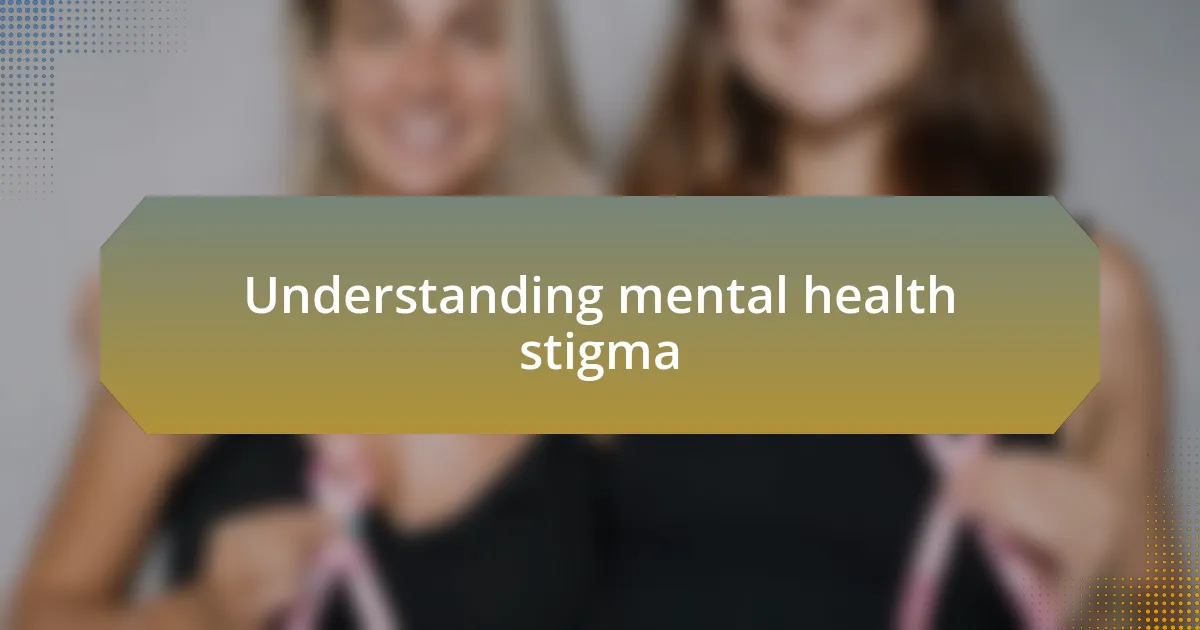Key takeaways:
- Mental health stigma can prevent individuals from seeking help and support, isolating them further from their communities.
- Open conversations and empathy are vital in addressing stigma and creating a welcoming environment for sharing mental health struggles.
- Charity work is impeded by stigma, as individuals may avoid resources, and donors may hesitate to fund mental health initiatives.
- Personal stories can inspire others to share their experiences, fostering connection and understanding within the community.

Understanding mental health stigma
Mental health stigma is a heavy cloak that many people wear, often isolating them from support and understanding. I remember a friend who faced severe depression but hesitated to seek help, fearing judgment from those around him. It’s heartbreaking to think that fear of stigma can keep someone from getting the care they desperately need.
When we label mental health issues as “weakness” or “lazy,” we miss the complexity of the human experience. Have you ever found yourself unsure of how to respond when someone opens up about their struggles? It can be uncomfortable. I’ve felt that discomfort too, which often stems from not knowing what to say. It’s crucial to recognize that our reactions can either worsen someone’s isolation or help them feel understood.
Addressing stigma starts with open conversations and empathy. A moment stands out in my mind when I shared my anxiety with a coworker. Instead of the expected judgment, I found support, and it felt like a weight lifted. What if we could create spaces where sharing our mental health challenges is as normal as discussing physical health? It’s these dialogues that can slowly dismantle the barriers stigma builds.

How stigma affects charity work
Stigma can significantly hinder the effectiveness of charity work focused on mental health. I once volunteered for a local shelter, and I realized that many individuals avoided utilizing its resources due to fear of being labeled. Seeing firsthand how stigma silenced their voices was deeply troubling; it underscored how essential it is to create a welcoming environment.
Moreover, it can lead to a reluctance among donors to fund mental health initiatives. I remember discussing this with a fellow advocate who shared her frustration over potential sponsors expressing concern about the perceived risks associated with funding these programs. Why should the fear of stigma dictate the flow of resources intended to help those in need? This situation only emphasizes the need for awareness and education in the charity sector.
In my experience, charities that actively work to combat stigma are more successful in reaching their goals. I’ve participated in campaigns that focus on storytelling, where individuals bravely share their journeys. These initiatives not only humanize the struggle but also bridge the gap between the charity and the community, inviting more people to join the cause. Isn’t it inspiring to think about how openness can change the perception of mental health and encourage community support?

Personal stories and experiences
I remember a young woman named Sarah who came to the shelter I worked at. Despite her evident struggles, she hesitated to seek help, worried about what others might think. When she finally shared her story during a community event, it was like a weight had lifted off her shoulders. Her bravery not only empowered her but also inspired others to break their silence. How many more lives could be transformed if stigma didn’t keep people from speaking out?
Another experience that stands out to me involved a support group I facilitated. One of the participants, Jake, was hesitant to share his mental health journey due to fear of judgment. As we began to open up about our experiences, I could see him slowly finding the courage to share his own. The room became a safe haven where vulnerability was met with compassion. Isn’t it powerful how shared experiences can foster understanding and connection?
I also think back to a community workshop where multiple participants shared their narratives for the first time. There was this palpable shift in the atmosphere; you could feel the empathy in the room. It struck me that each story added layers to our collective understanding of mental health. Why should anyone feel isolated when sharing such profound experiences can truly unite us?

Encouraging conversations about stigma
Encouraging conversations about stigma is essential in dismantling the barriers that prevent people from sharing their struggles. I recall a time when I organized a casual coffee chat in the shelter, encouraging guests to freely discuss their experiences with mental health. It started with just a few brave souls sharing, but soon, others joined in, realizing they weren’t alone in their feelings. Isn’t it fascinating how a simple invitation can unlock a floodgate of shared experiences?
During another session, a participant named Lily surprised us all by reading a powerful poem she had written about her journey. Her words resonated deeply, igniting a conversation filled with raw honesty and tears. In that moment, everyone felt a sense of belonging, and the stigma began to fade. How can we create more of these spaces for authentic dialogue?
I often think about how our communities can serve as catalysts for change. Hosting open forums or workshops creates opportunities for individuals to express themselves without judgment. This collective sharing isn’t just healing for the speaker; it also cultivates empathy among listeners. What if we prioritized these conversations as part of our community fabric?